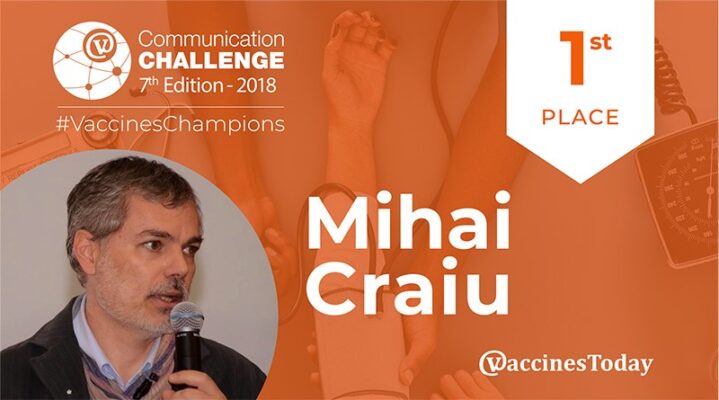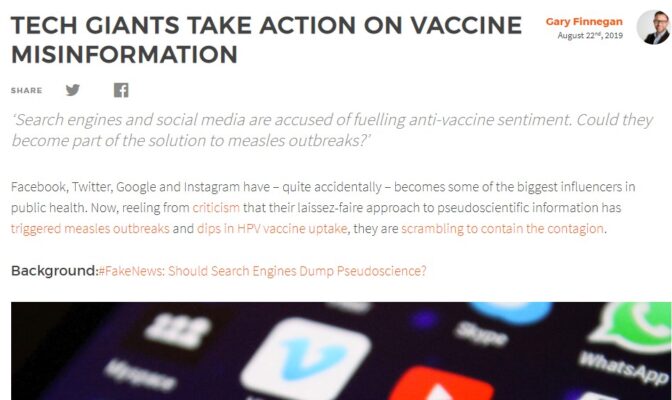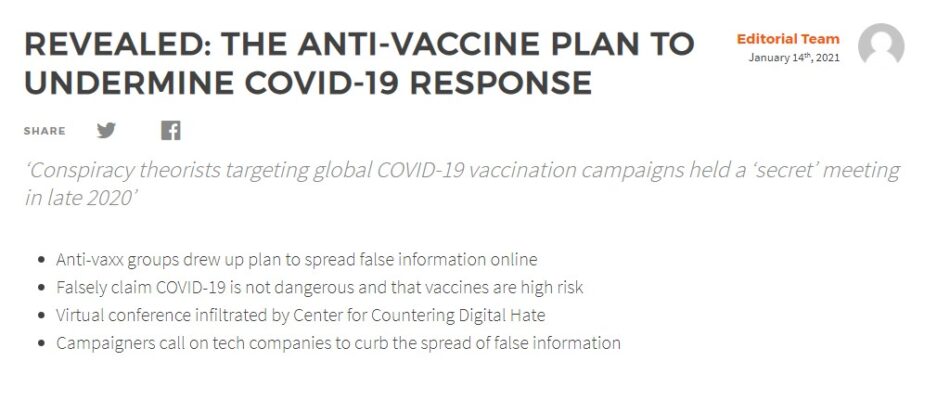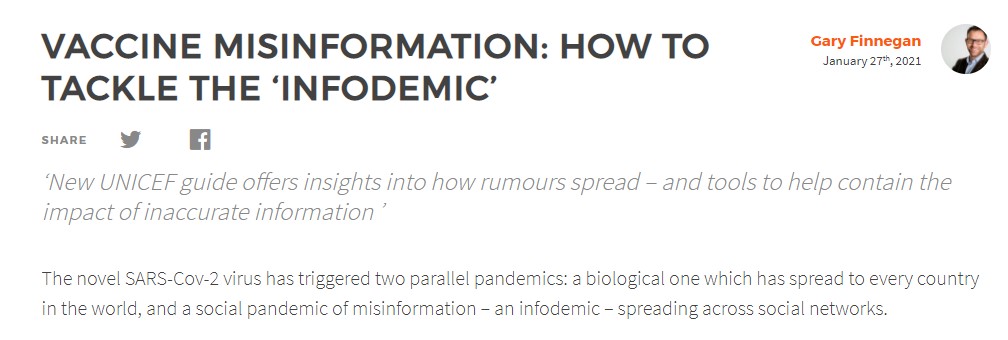Vaccine hesitancy is as old as vaccination. We shouldn’t be surprised: to accept a vaccine, people need to trust that the substance injected into their arm is safe and that it will work. That requires some degree of trust in health professionals, scientists, regulators and governments.

Uncertainty can amplify vaccine hesitancy and is fertile ground for conspiracy theories. So, when the biggest global pandemic in living memory was declared in March 2020, anti-vaccine ideas spread quickly. This was facilitated by the fastest, farthest reaching communications networks in history – social media channels.
But before we jump into the COVID-19 pandemic and look to the future, let’s first take a step back. Vaccines Today was founded in the wake of the 2009/2010 H1N1 pandemic, amid concerns that vaccine advocates were absent from online conversations about vaccines. This had left a vacuum which was filled by anti-vaccine voices.

In the meantime, slowly but surely, vaccine advocates have emerged. In 2018, we ran a Europe-wide contest to find #VaccineChampions. The winner, Dr Mihai Craiu, a paediatrician in Romania, uses his enormous Facebook following to share science-based information on immunisation (and other children’s health issues).
Later the same year we met US-based paediatrician Dr Todd Wolynn whose online channels had come under attack from anti-vaccine campaigners. 12-months later, Dr Wolynn had developed a plan to mobilise health professionals to push back against anti-vaccine harassment.
Along with doctors, nurses and pharmacists, we’ve met vaccine champions from all walks of life. Ethan Lindenberger was thrust into the spotlight when he publicly signed up for his vaccines in defiance of his mother. He found himself speaking at major conferences and becoming the subject of a TV documentary.
Lindenberger also preached empathy for people like his mother whose intentions were good, but had been influenced by false online rumours.
Prior to the pandemic, tech giants were already under fire for taking a laissez-faire approach to containing misinformation about vaccines. The big players also faced accusations that they prefer a hands-off approach because taking action might lock them out of a $1 billion advertising industry. Some began working with the WHO Vaccine Safety Net, the European Commission and others.

Then the pandemic hit.
COVID-related myths emerged and spread quickly, sometimes bringing anti-vaccine activists together with other conspiracy theorists opposed to masks, restrictions and even 5G mobile phone technology.
Anti-vaccine groups held meetings to coordinate their campaigns before COVID-19 vaccines could be introduced. It was, they argued, an opportunity for vaccine opponents to increase their influence and ultimately undermine trust in authority.
In response, US President Joe Biden urged social media companies to tackle dangerous misinformation which he said is slowing efforts to curb the pandemic even in countries where vaccines are readily available.
‘The pandemic was a perfect storm for the propagation of misinformation,’ said Krisztina Stump who leads the European Commission’s work on disinformation. ‘Misinformation is not new but social media offers unprecedented speed and scale for spreading vaccine-related misinformation with the potential to undermine confidence. The stakes are high.’
The Commission has encouraged big tech companies to sign a Code of Practice on Disinformation and is tracking their efforts to take action on information related to vaccines. For their part, social media networks say they are encouraging people to get vaccination, pointing users towards reputable websites, labelling questionable content, and penalising individuals and organisations that spread false information.
‘Social media platforms have done more than ever before to take steps against disinformation,’ she told a webinar hosted by Think Young. ‘We acknowledge this but still more needs to be done.’

Ania Helseth, Facebook’s EU Affairs manager, said the network’s approach to reducing the harm caused by misinformation is to ‘remove, reduce, and inform’.
‘The priority is to connect people with authoritative sources of information on COVID-19 in general, and on vaccines in particular,’ she said. ‘This is preferable to removing information altogether as this risks accusations of censorship. However, we will continue to take down misinformation that leads to real-world harm.’
The pushback
However, there is a silver lining. Just as the pandemic has unleashed an unprecedented anti-vaccine campaign, it has also inspired greater efforts to tackle misinformation. The WHO began training ‘infodemic managers’ to identify and respond to rumours before they can go viral.
The UN launched its Verified initiative, encouraging people to critically review online health information, while the WHO Vaccine Safety Net stepped up its efforts to bring quality information to people around the world.

UNICEF published the Vaccine Misinformation Management Field Guide, in collaboration with First Draft, the Public Good Projects and Yale Institute for Global Health. It offers an introduction to vaccine misinformation and many actionable recommendations for addressing misinformation and, just as important, the normal vaccine-related questions people may have.
The European Centre for Disease Prevention & Control (ECDC) has published a guide to countering online vaccine misinformation (see tweet below). It frames the task of pushing back against false information as part of a broader effort to improve the resilience of the healthcare system.
Meanwhile, organisations including Stronger, Project VCTR and Project Halo have also provided new sources of data on rumours and responses to misinformation.
Dr William Budd, a young doctor and member of Team Halo, is using Tik Tok and Instagram to bridge the perceived divide between the public and experts. ‘It’s important to address concerns in a relatable way rather than alienating people,’ he said. ‘By responding to topics trending on channels that young people use – such as questions on vaccines and fertility – we can address misinformation before it takes hold.’
In sum, there is a lot going on. The pandemic has spawned a surge in misinformation but also united professional, institutional and non-governmental organisations to play their part in improving online information about vaccination.
The question is whether this will be one of the lasting legacies of the COVID-19 pandemic.
Angus Thomson, Senior Social Scientist with UNICEF and author of the Vaccine Misinformation Field Guide said: ‘We now know how to inoculate people against misinformation, and this is well described in the guide. However, we first have to be able to track and characterise the misinformation narratives, and the information needs of people, before we can respond. Hopefully this infodemic may motivate countries to establish routine social listening in their vaccination program.’
While the early months of the pandemic saw a boom in misinformation about vaccines and other health-related topics, it may have sparked a muscular response from social media platforms, institutions and policymakers.
One thing is certain: Vaccines Today will continue to play its part in the information ecosystem, sharing high quality information and addressing people’s questions and concerns on social media.
This was the final article in our 10-part series marking the first decade of Vaccines Today. Read the other features in our Stories section.




